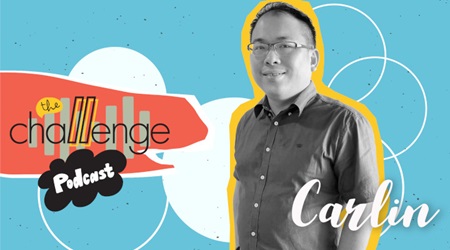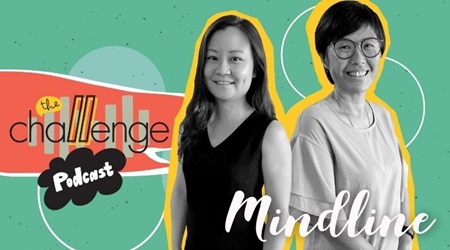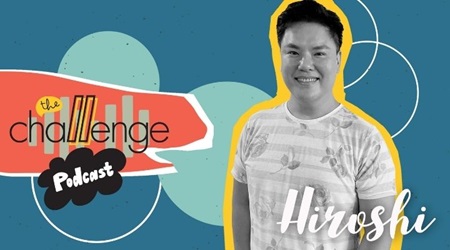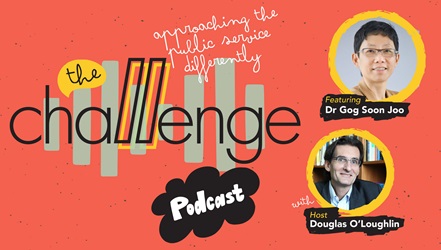Employee Wellbeing And Self-Care
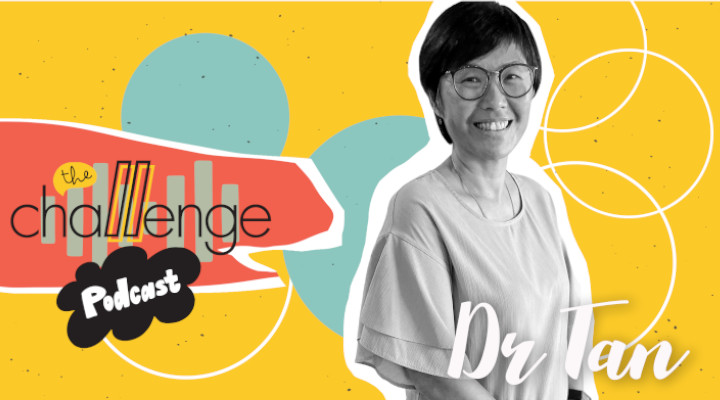
Employee wellbeing has become something of a buzzword. We speak to Dr Tan Weng Mooi from MOH’s Office of Health Transformation to find out how to go about improving organisational culture to make the workplace more pleasant. Transcripts have been edited for clarity and language.
Transcript
Host: Douglas O’Loughlin
Audio: Fei
Douglas: Hello and welcome to the Challenge Podcast where we discuss all things public service in Singapore. I am your host, Douglas O'Loughlin, an organisation development consultant and a former public officer.
In this episode we are honoured to have with us Dr Tan Weng Mooi, from the Ministry of Health’s Office for Healthcare Transformation, or MOHT. She is the Director and Co-Head of Integrated Health Promotion. Dr Tan, welcome to the show!
Weng Mooi: Thank you. (In Hokkien) Have you eaten?
Douglas: Yes. And you, (In Malay) have you eaten?
Weng Mooi: Yes.
Douglas: And in case you are not catching that, we are checking in with each other to see if we are okay. And it is okay not to be okay too. If we were not okay, we would say that to each other.
Weng Mooi: Yes, absolutely. In fact, if I may share, many years ago I went to do a study trip to New Zealand. And I was in Christchurch not long after the 2011 earthquake. And along a whole street, we saw a banner with the words: “Are you OK?” And in Singapore, when we meet people, we typically ask if they have eaten. So I think it is a good way to normalise such conversations to check in with each other.
Douglas: So, you know, according to a Gallup survey or research, out of the five wellbeing areas – career, community, social, financial and physical – career comes out on top because it is considered “the very foundation of the best possible life”. Do you resonate with this?
Weng Mooi: Well, I wouldn't say 100%. But if you are looking at the Gallup survey they were targeting people who are working. So the result would depend on the phase we are in. If you are already retired, you are not going to talk about a career but perhaps about being meaningfully engaged. But for those who are working, certainly, because that is the time for them. And especially young adults, who are starting out and being independent and looking forward to buying a house or marriage and things like that.
So yes, career certainly brings you the identity, a purpose in life, as well as perhaps gives you the financial means. But to me, at the end of the day, what is important is really having the balance between work and your own personal life. Because when you are too extreme at either end, you might end up having problems.
Douglas: Well, and I guess just to add to that, I suppose if somebody is a stay-at-home parent, that's a career choice of sorts, just to make sure that group feels included.
Weng Mooi: Oh, absolutely.
Douglas: So what role does employee wellbeing play within an organisation? And how do you measure it?
Weng Mooi: Every organisation, even the very high tech ones, needs people. So to me, humans are the key resource in any company or organisation. And as people, we have emotions, our physical health, our ways of thinking and seeing things. For this reason, I think our overall wellbeing – be it physical, mental or social – is absolutely important. And there are many different measurement tools out there. I will name just two.
One is mindline.sg or mindline at work. We also have one that is tailored just for the Public Service. So you can go onto these sites on a regular basis and assess your mental health status based on two clinical evidence tests. These are GAD (Generalised Anxiety Disorder) and PHQ (Patient Health Questionnaire), since anxiety and depression are quite common.
MOM (Ministry of Manpower) has come up with one as well, together with quite a few partners – CGH (Changi General Hospital), IMH (Institute of Mental Health), HPB (Health Promotion Board) – and they call it iWorkHealth. It is a 70-question self-assessment and gives you a very good report. I personally feel this one is very good.
And because most companies do staff surveys every 12 to 18 months, what they could do is supplement their surveys with these self-assessment tools to look into the mental health status and wellbeing of their staff.
Douglas: How would people access that?
Weng Mooi: Oh, they are all available online free of charge, including iWorkHealth which you can access via MOM’s website. You can register your organisation anonymously and it is quite safe.
Douglas: You know, one of the most inspiring consulting projects I ever did involved a CEO who was facing huge competition and losing money. But he said, the most important thing I want is to see people coming into work looking like they're happy to come to work, not like they're dragging their feet. Wouldn't it be nice to want to create and co-create workplaces people look forward to?
Weng Mooi: Yes, absolutely. In fact, some organisations have adopted this thing called joy at work, which, I think, was started by Google. They look at different facets and aspects of the work environment, individuals and supervisors and how they affect each other and communicate with each other. So there are plenty of frameworks out there to help people.
Douglas: Yeah, actually, I've been hearing quite a number of our senior leaders in the Public Service talking about joyful meetings and having a joyful government. And it's nice to put that word out into the system. So when you think about an organisation creating a place where people feel good to come to work, what are some of the other things they can do to foster that? How do we create a culture that supports wellness?
Weng Mooi: There are different aspects and for me, they are about what I call the 3 Es. It starts with engagement. You need to engage people. A lot of leaders see engagement as just talking to staff about how well they are doing and the future. But engagement could take different forms. It could be as simple as engaging your people to see how happy they are, how they feel about their work and the work environment. You could also engage them with regard to their mental wellbeing through webinars and so on, so that they can increase their awareness of the need to take care of themselves.
Next, we have empowerment, which is about giving one control and the ability to make decisions. And it has to come with knowledge and training as well. If you want staff to be able to perform their tasks properly, they need to be trained. You cannot just introduce new systems and expect them to be proficient without providing them any tools.
And when it comes to mental wellbeing, it is the same thing. You need to train your supervisors to be able to look out for signs and symptoms of distress or mental issues. Otherwise you would end up with a situation where a staff might need a break but your supervisor insists on the need to meet a deadline.
The final E is enablement. For culture to develop, you must have policies. And you must have a platform like mindline at work for the Public Service. So that when you talk about mental wellbeing, you have a platform like this that you can access anytime in a safe and anonymous manner. And the same applies to HR policies. If you tell people it is important to take breaks but expect them to work 24/7, it is not going to work.
And I think most importantly, leaders must set an example. They must be prepared to walk the talk. So recently there was a Korean drama series called It’s Okay To Not Be Okay, and now we have leaders talking about it. Another buzzword now is “vulnerabilities”, to be able to show you are human and need breaks as well, to be able to show care and concern. And I think it is very important to set the fundamentals and value system.
Another very important aspect – which is also a little dream of mine – is to normalise discussing mental health. I ask my HR colleagues sometimes: why do we talk about mental health only when someone needs counselling or needs a therapist? Why can we not see mental health as the WHO (World Health Organization) defines it? It is not about an absence of disease or illness, but how one performs and functions on a daily basis.
So let’s look at the HR recruitment process. When we hire top leadership, we spend money doing assessments and look at one’s personality to see how they can fit into the culture. Why not conduct a simple test to look into an individual’s strengths, understand their personality, and also let them understand themselves? Because an imbalance between one’s own expectations and those of a boss, and even with one’s own skills set, might point to the fact that one may not be ready for the job.
So we need to see a person’s development and effectiveness from a people-centred viewpoint. I think it would be helpful for HR to start seeing an individual as an individual and help them. Of course, at the end of the day, they must also match the organisation’s needs.
Douglas: So we talked about this idea of authenticity and how people need to show it. That begins with trust. And as a Public Service, this idea of being authentic and trusting is still a little new to us. How do we improve on this?
Weng Mooi: Personally, it comes down to the fundamentals: do you see this person, your staff, as a person? Or is this person only meant to meet a KPI because they have been paid? So if you start seeing a staff member as a person, as an individual, you will realise that you would need to look at things quite differently.
Douglas: I mean, it sounds amazingly trite to say, to look at people as human beings, but sometimes it is and we can forget that…
Weng Mooi: Absolutely. In fact many years ago, I attended a conference and this guy told us that when Alaskans introduce themselves, they speak about themselves. So for example, it would be something like, hi I’m Weng Mooi, a mother of 2, and I enjoy swimming and some other things. But in Singapore, how would you introduce yourself? You say, hello, I’m Dr Tan, a director of an organisation and this is what I do. We attach our work to our identity. So I think it is important for us to go back to the fundamentals and see ourselves as individuals, not as a director, executive or secretary.
Douglas: I’m wondering about the effect of COVID-19, because on the one hand, it has raised awareness about mental wellness and how people are doing, so that seems like a very positive thing. On the other hand, a lot of public officers I know, and other people around the world, are quite burnt out because of all the extra things they are handling, especially if they have children and maybe parents in small homes where conditions are not ideal. How would you rate the overall effect of COVID-19?
Weng Mooi: Recently I gave a talk at a conference about whether COVID-19 was a boon or bane for mental health. I mean, we know COVID-19 has impacted everything, every facet of our life. And working from home doesn't always help. For some of us who are luckier, we have rooms to escape to for ourselves. But not everyone might have that. They have to juggle their kids and look after their families, which create a lot of stress. And safe distancing impacts this as well.
On the other hand, COVID-19 has also created a lot of awareness and cast a spotlight on mental health. One area I think it has had a good impact is that people no longer equate mental health with behavioural problems. Prior to the pandemic, when you read a report about a driver that beat someone up, you would think they are crazy or have some mental health issues. The reality is that they might have anger management problems. We just do not know.
A lot of people used to think mental health issues are something they would not have, but the reality is every one of us will be affected. In fact, I read a report that was commissioned by WHO that said one of the top global disabilities is depression. And in Singapore, a mental health survey said one in seven of us would have mental health issues. So I think COVID-19 has increased awareness about this and we need to take care of our mental health and wellbeing.
Douglas: You know, the one thing I find a little confusing about mental health or mental wellness is when you read about what to do to be well, it is often not just mental: it is exercise, eating and sleeping well. These are physical things. There is also the need to connect with our emotions, get in touch with our sense of purpose in life, the spiritual aspect, meditation or taking some silent time. How does mental health capture all of that? Could you break it down a little?
Weng Mooi: So when you look at a person, what we see externally is their physical being. Internally is where you find the mind and emotions. And if we look at the brain, there is this concept of the old and new brain, so to speak, where the old brain is thousands of years old – it is called the amygdala. This is the part that controls our fears. When you experience fear, you tense up and your heart pumps very fast. Nothing wrong with that, of course. It helps you run away when you see a tiger, for example, because you do not want to just stand there.
The new brain is where you learn to plan your decisions. So mental health is part of that system because when your brain is stimulated, your hormones and the chemicals within will create an emotional response. This in turn may also affect you physically – when you sweat, for example. So it is all connected. But we often like to think they are different: the brain and mental health versus your body and physical health.
The other thing to consider is the social environment. For example, green spaces make you feel good. And there are a lot of studies that show people with bipolar disorders could be affected by seasons, especially autumn and winter. So again, all this is interconnected.
Douglas: It feels like we could use a more overarching term because we've talked about the spiritual, mental, emotional, physical, and social aspects, and even nature’s role in this. Do we need to invent a new term to sort of encompass all of this?
Weng Mooi: WHO has this definition of wellbeing or wellness that encompasses the physical, mental and social. For social, this is where your finances, relationships and spirituality come into play. In terms of spirituality, it helps build your inner wellbeing, be it through meditation, doing mindfulness or yoga.
So personally I do not think those terms make a major difference on a daily basis. At the end of the day, the individual needs to learn to reflect and look at things, and ask how they are feeling in a very simple manner.
I mean, we wash and scrub our faces daily, don’t we? But do we scrub our brains as well? Do we give our brains a break, a break from thinking too much? So it is important for us to start seeing ourselves as individuals holistically, and knowing that our mind will affect our body, and our body will affect our mind.
Douglas: So it could even be something as small as a five-minute walk or to close our eyes for a few minutes, something like that?
Weng Mooi: Yes, absolutely. So when it comes to physical health, it basically means you should do some exercise. So ideally you should exercise for 30 minutes, five times a week. But not everyone can do that. So you can do a little bit of walking and things like that.
Or you could take a hot shower, give yourself a break, walk your dog, spend time with your pet or play with your children. Take those five to 10 minutes to do these things. And I think it makes a lot of difference. And to take care of your physical health, you should also make sure you eat and sleep well.
So there are a lot of things you can do. Some people write journals as well. You know, to just take a step back after a whole day’s events, to reflect and write down their thoughts. And I think it is important to write about the good things that happen to you each day as well, and not just dwell on the negative. It is also important to have a good social network – be it your family, friends, or colleagues – who can provide positive energy, especially in times of distress.
Douglas: In Singapore, generally the sentiment is that we are a super busy and stressed society. COVID-19 has made us a little more aware of this. Are there any big shifts, you think, that we need to undergo to improve our wellbeing?
Weng Mooi: I think there needs to be some shift in the way we see and deal with our lifestyle and the way we work. We need to understand how the environment affects us. We are always rushing and supposed to be number one at many things. And I think that creates a little bit of tension for us and even our children.
So we need to see how to take a step back. How do we relook our priorities and what it is that matters to us? We can do this with what I call ABCD. First, you should start assessing your own physical health, mental health, your environment and your job. What is it that makes you happy?
Then you need to look into how you could balance what you want in life versus what you have right now. For example, if you are a new parent, do you want a promotion at work? Because with a promotion comes certain responsibilities and accountability. And being new to the role would require time for you to adjust and learn. So you need to ask yourself, is this what you want right now?
Which leads us to C, where you need to give yourself choices. Can you delay this promotion? Can you talk to your boss about it? And if you do go ahead, how much help can you get from your partner? What is your family’s situation at that specific point in time?
And then you decide. You also need to look into self-care, to make sure that once you make a decision, you are still able to take care of yourself physically, mentally, spiritually, as well as understand your professional and environmental circumstances.
Douglas: One of the things that come to mind is also to be gentle with ourselves, yes? I mean, in our drive to be number one, people sometimes get sick and they feel bad about it because there is work to be done, and they end up feeling worse because of the added stress that causes. So maybe when we do the ABCD, we could do it with more compassion not just for others, but ourselves as well?
Weng Mooi: Yes, I think you are right. As part of self-care, be compassionate and not be too judgemental of yourself. Learn how to set boundaries at work. If you have to pick up your children at six, then you need to set a boundary and make prior arrangements with your supervisors. Or look for someone who can help.
Douglas: And we can still get things done! We can still be excellent, right? So as we finish, do you have any words of wisdom for our listeners?
Weng Mooi: Perhaps I will end with a talk I gave on the ARC of caregiving, in this case the ARC of self-care. So ARC stands for acceptance, reflection, and connection.
Acceptance means it is very important for us to accept our situation and issues. Accept who you are, what you are. And accept that every one of us has strengths and every one of us may have areas where we need to improve. Only then can we effect change where we need to.
R is about reflection. It is important for us to learn to take time and reflect. It could even be during a warm or cold shower. Reflect by asking yourself, how and why am I reacting to whatever is being said to me? Am I getting enough sleep? Am I too stressed out? Engaging in a little bit of reflection is very important. Or you could practise mindfulness as well.
And finally, C stands for connection. It is must start with you – you need to connect with and understand yourself. The other connections are really about the people around you: friends, family, boss and the larger community as well. You will realise there are people out there who may have the same problems and concerns as you. And studies have shown that when you contribute to the community, you derive pleasure from it. So instead of just a support system, you find meaning by giving as well.
And the key thing is this: we always think about tomorrow or yesterday, and forget the gift of the present. By being present, you can see the rainbow. And when do you see a rainbow? When light shines on water vapour after a storm. Now the question is, do you want to have a memory of a beautiful rainbow, or keep the memory of a dark cloud?
Douglas: Wow, what a lovely reminder as we finish. Thank you so much, Weng Mooi, for this. So everyone, let's create more rainbows and all the best to all of us to be well, individually and collectively.
Thank you for listening to this podcast. I’m your host Douglas O’Loughlin. Follow us for new episodes, and follow psd.gov.sg/challenge for more public service stories.

To hear more conversations like this, follow the Challenge Podcast on Spotify.
- POSTED ON
Dec 2, 2021
- TEXT BY
Keval Singh
-
Season 2: Mental Wellbeing
Centring Yourself Through Mindfulness
-
Season 2: Mental Wellbeing
Mindline.SG and the Road To De-stigmatising Mental Health Issues
-
Season 2: Mental Wellbeing
The Case for Employee Wellbeing




